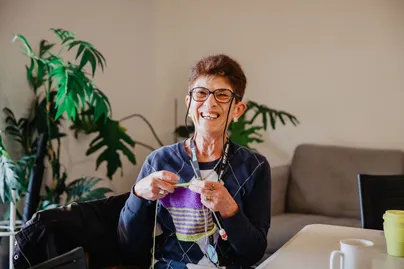Change can have a great impact on mental health for older people. Learn about life transitions and mental health, as well as how to stay mentally healthy during tumultuous times.
As life unfolds, change is inevitable. Whether expected or sudden, transitions can bring a mix of emotions. This can include excitement, uncertainty, or even grief. While change can feel overwhelming, the right strategies can help you adapt. This helps you stay balanced and live with purpose.

Common life changes you may experience
Some of the transitions you might navigate include:
- Preparing for retirement
- Taking on a caregiving role
- Welcoming new grandchildren
- Experiencing grief and loss
- Managing new health conditions
- Relocating to a new home
You may expect some of these changes to be mostly enjoyable, such as gaining a grandchild or retiring. You may be dreading others. Either way, any of these major life events can disturb your daily routines and destabilise your mental health.
Why mental health matters
- Chronic stress can weaken your immune system, making you vulnerable to illness.
- It can worsen existing health conditions.
- Simple wellness strategies can help you cope with difficult times.
10 tips for staying mentally healthy through change
1. Follow routines
A predictable daily routine can create a sense of stability and reduce stress. Even small things like a daily morning walk or a regular cup of tea in the evenings can help. If your routine has been disrupted (for example, if you’ve recently moved to a new home), keeping up with small habits can help bring comfort and consistency to the chaos.
2. Stay connected
Maintaining social connections is important for your mental and emotional health.
There are many ways to stay socially connected. For example, you can:
- Join local clubs
- Connect to others via the internet
- Reconnect with old friends
- Reach out to family
3. Volunteer
Volunteering and helping others can be a powerful way to find meaning. Giving back supports your sense of community and purpose. This can be especially helpful if a recent change has made you feel powerless.
Volunteering opportunities can include mentoring, community work, or supporting a local charity. You can search our social activities database for volunteering groups near you.
4. Be kind to yourself
Self-care refers to behaviours that help you be kind to yourself. Activities like journaling, gardening, knitting, or simply taking a calming bath can improve your mood and provide a sense of calm.
If you're feeling overwhelmed, try engaging in something soothing that you genuinely enjoy.
5. Practice mindfulness
Practicing mindfulness means observing your feelings and surroundings without judgment or resistance. Try to think of yourself as a neutral observer of your thoughts and feelings.
Mindfulness can support mental health as well as brain health. That means it can support your thinking skills too, such as memory.
Yoga and Tai Chi may be worth a try if you want to explore this practice, since they incorporate mindfulness techniques. You can also find mental health apps to help improve your mindfulness skills. For example, Smiling Mind is a mindfulness meditation app developed by psychologists and educators, with meditations available in English and some Indigenous languages.
6. Practice gratitude
Once you’ve acknowledged your feelings, both positive and negative, you can see what makes you happy. Focusing on what you’re grateful for can help you build emotional resilience. Consider keeping a journal for thoughts of gratitude. If that’s too formal, you could simply take a moment each day to appreciate something nice, no matter how small.
In 2024, LiveUp interviewed 105-year-old health advocate Dr Gladys McGarey. She shared this wisdom: accept difficult feelings and embrace positivity. Some changes are inevitable. By practicing mindfulness and gratitude, you can learn to accept and even embrace new situations.
7. Seek support when you need it
Even manageable changes can feel unsettling. If you’re struggling, reach out. You can talk to loved ones, a trusted professional, or a helpline.
Here are a couple helplines that are always available to you:
- Lifeline – for mental health crisis support, call 13 11 14, 24/7, text 0477 131 114, or chat online. Anyone in Australia can speak to a trained Crisis Supporter any time of the day or night.
- Beyond Blue – for emotional support, call 1300 22 4636 (24/7), or chat online. Beyond Blue is a mental health support service that connects you to a person to talk to on those days when things seem too much, or something isn’t quite right.
You can also access free mental health support at MindSpot, a digital mental health clinic with online courses such as the Wellbeing Plus Course. This is a clinically proven treatment that helps adults aged 60+ improve their psychological health and overcome symptoms of depression and anxiety.
You can read more information about finding mental health support here. Remember that seeking support is a sign of strength and wisdom, not weakness.
8. Eat well
Looking after your body is even more important during stressful times. This means eating a balanced diet, so your body gets all the nutrients it needs to function well. A balanced diet not only supports your body, but also your mental health.
Remind yourself to eat and drink water even if your appetite is low.
9. Improve your sleep hygiene
Major life changes can sometimes cause insomnia, especially if you’re sleep reactive. (Sleep reactivity is when stress can easily cause you to have poor sleep.)
Quality sleep is essential to your physical and mental health. Good sleep hygiene habits, such as limiting screen time before bed, can support better sleep quality.
10: Exercise!
Movement is powerful medicine. Exercise is good for your mental health.
Regular physical activity can help to improve your mood as well as boost your overall health. Walking, dancing, or even just household chores and gardening can be great ways to stay active throughout the day.
Self-reflection is key
Here are some questions to consider:
- How do you typically handle change?
- What emotions do you typically feel during change?
- What are your coping methods for difficult feelings?
You can do what you want with the answers to these questions. Asking them may just be a good place to start.
Here’s a challenge for you:
Try one new activity this week that helps you embrace change. This could be doing something you don’t normally do or going somewhere completely new to you.
Change is a natural part of life. But with the right mindset and support system, you can embrace new life stages with confidence and resilience.
Get in touch with LiveUp
If you need more information about mental health for older people, or about healthy ageing in general, don’t hesitate to get in touch with one of our helpful navigators on 1800 951 971.
References
Beyond Blue. Routines and mental health. https://www.beyondblue.org.au/mental-health/wellbeing/routines-and-mental-health?utm_source=chatgpt.com
Healthdirect. (2024, February). Older people and mental health. https://www.healthdirect.gov.au/older-people-and-mental-health?utm_source=chatgpt.com
Morin C. M. (2022). Why do some people develop insomnia in response to stressful life events and others do not? Sleep, 45(11), zsac207. https://doi.org/10.1093/sleep/zsac207
Scott, A. J., Webb, T. L., Martyn-St James, M., Rowse, G., & Weich, S. (2021). Improving sleep quality leads to better mental health: A meta-analysis of randomised controlled trials. Sleep Medicine Reviews, 60, 101556. https://doi.org/10.1016/j.smrv.2021.101556
Somerville, C. (2021). How stress can stop immune cells in their tracks. University of Melbourne Newsroom. https://www.unimelb.edu.au/newsroom/news/2021/april/how-stress-can-stop-immune-cells-in-their-tracks
Tabassum F, Mohan J, Smith P. (2016). Association of volunteering with mental well-being: a lifecourse of a national population-based longitudinal study in the UK. BMJ Open, 6(8), e011327. https://bmjopen.bmj.com/content/6/8/e011327
University of Maryland Medical System. (2020, November 10). How stress affects your immune system. UMMS Health. https://health.umms.org/2020/11/10/stress-immune-system/
Whitfield, T., Barnhofer, T., Acabchuk, R., Cohen, A., Lee, M., Schlosser, M., Arenaza-Urquijo, E. M., Böttcher, A., Britton, W., Coll-Padros, N., Collette, F., Chételat, G., Dautricourt, S., Demnitz-King, H., Dumais, T., Klimecki, O., Meiberth, D., Moulinet, I., Müller, T., Parsons, E., … Marchant, N. L. (2022). The effect of mindfulness-based programs on cognitive function in adults: A systematic review and meta-analysis. Neuropsychology Review, 32(3), 677–702. https://doi.org/10.1007/s11065-021-09519-y
How to use this information
LiveUp provides free information to help you make informed decisions about your health. This information is for general and educational purposes only, is not intended to provide a comprehensive guide, and does not replace medical advice. Everyone is different, so some of these tips may work better for you than others. You should use your own judgment and seek medical advice when applying this information to yourself, to determine if it is suitable in your circumstances. Your use of, or reliance on, this information is solely at your own risk. Independent Living Assessment Incorporated is not responsible or liable for any injury, loss, or damage caused as a result of your use of, or reliance on, this information.
Download and print this article:
You can print out the PDF and stick it to your fridge or file away the tips to revisit at a later time.

Read more Mental health articles
Did you enjoy this article? You may also like reading similar healthy ageing articles.
See all Mental health articles

